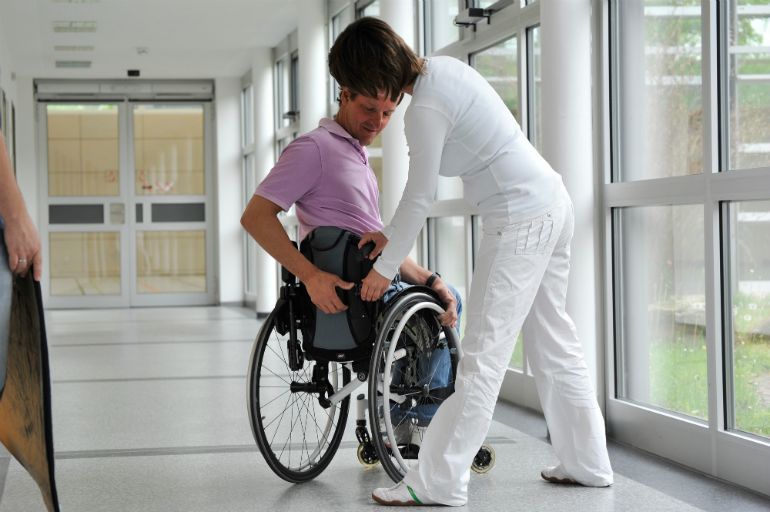Share:
Take it offline!
This Education in Motion resource is also available as a printable PDF.
Download PDF
Proper wheelchair maintenance is key to ensuring the mobility, performance and safety of your equipment.
In this post we shall touch upon some of the recommendations for the daily care of your wheelchair and upon which things you should check most regularly.
How often do I have to check over my wheelchair?
The maintenance of a manual wheelchair depends upon the model and the type of use it is subjected to. It is worth bearing in mind that certain features are subject to greater wear and tear and so must always be in perfect condition in order to ensure their proper function and safety.
As a general rule you should check the tyre pressure every month, as well as the condition of the brakes, the backrest and all moving parts. It is advisable to take a look at the quick release mechanism, the anti-tip system (if fitted), footrest and upholstery every 3-4 months, as well as cleaning the chair frame. Correctly maintaining a wheelchair should also entail an annual check by an authorised supplier familiar with the product and how to carry out repairs on it.

Key elements: basic check for your wheelchair
In the maintenance and user manual for your wheelchair you will find specific points that cover each of these elements so as to verify their correct operation.
o Brakes
A weekly brake check is recommended, though the user is best qualified to pick up on any possible issues through daily use.
Braking efficiency can be impaired by poor placement or by an incorrectly adjusted part, as well as low tyre pressure. Wet tyres can also lead to poor brake performance. Check these points to confirm that your brakes are working properly.
o Front wheels
A wheelchair's front wheels are very important and should be checked as part of any proper maintenance procedure, paying attention to their fit and functionality.
One of the most common problems is that the wheelchair does not move fluidly or that it moves slightly to the left or to the right. To avoid this, check that the play and angle of the wheel are adjusted enough so that both front wheels touch the ground and can rotate freely.
o Tyres and inner tubes
It is essential for the mobility and maintenance of the wheelchair that the tyres and inner tubes be in good condition. The correct tyre pressure is also important in order to ensure the best possible performance. If the pressure is too low, it will require greater effort to propel the chair as it will not roll or manoeuvre as freely; if the pressure is too high it could cause the tyres to burst or to wear down unevenly.
As a general rule the recommended tyre pressure is usually printed on the tyre itself by the manufacturer.
Wheelchair tyres are similar to those used on bicycles, so fitting them follows the same process. Before fitting the inner tube, make sure that the inside of the wheel rim and the inner tyre are clean. It is important to check the pressure once it has been fitted.

General wheelchair care and maintenance
- Check the tyres (pressure and general condition) on a monthly basis.
- Check that the brakes are working correctly and are properly tuned, paying special attention to the fittings.
- Check every 3-4 months that all screws are secure. Check that all of the joints that are important for user safety are self-locking with special bolts. These should be used ideally only once and should be replaced after several uses.
- Clean the frame of the chair using a mild detergent. The backrest and cushion should only be cleaned using soap and water. If in doubt, check the manufacturer's guidelines.
- Use only original parts or those recommended by your wheelchair's manufacturer.
- If the seat gets wet, try to dry it after use and do not store it while still wet. The wheelchair should also be cleaned if coming into contact with sand or salt (for example, after being at the beach) as both can damage the wheel bearings.
- Apply a small amount of oil onto the axes to allow for quick disassembly. This should be done according to use, although it is usually advisable to do so every two months. Moving parts should also be lubricated if the chair becomes difficult to move or if it begins to creak.
- If you plan to store your wheelchair for a long period of time, try to cover it and leave it in a dry place that is protected from the sun and at room temperature. Before using it again, you should undertake a complete wheelchair maintenance check.
As you can see, these steps are very easy to follow and will help you to extend the lifespan of your wheelchair and simplify its day to day use.

At Sunrise Medical we provide instruction manuals for each of our products, providing you with all of the relevant information on optimal maintenance and care to help you keep your manual wheelchair in good working order.
We also have a highly trained network of Quickie agents who are on hand to offer regular maintenance and servicing to your wheelchair.
Take a look at the full range of Quickie manual wheelchairs.